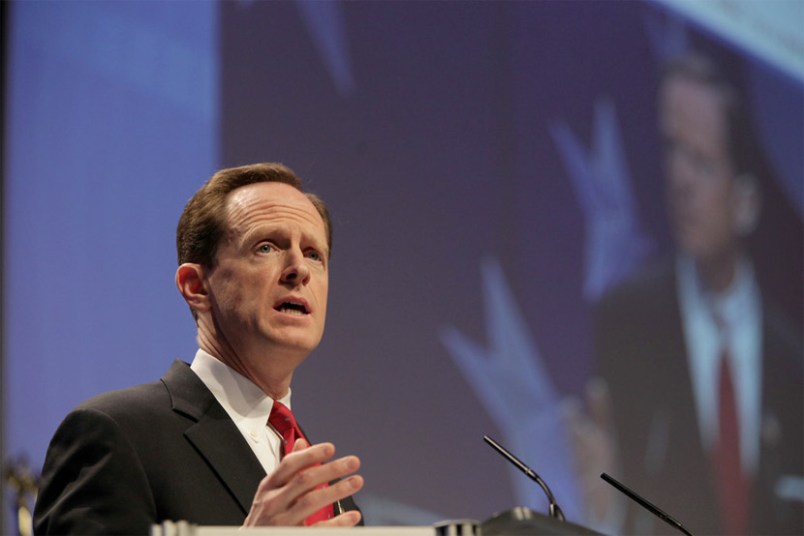Top Republicans in Congress are advancing the idea that allowing the U.S. to default on its debts for a short time will be fairly harmless, and is a far better option than lifting the debt ceiling without simultaneous, dramatic spending cuts.
The new push comes just days after the country hit its statutory debt limit. In essence, the GOP is arming itself with a rationale to continue to oppose a debt ceiling hike, despite dire warning from economists, finance experts, and the Obama administration about the consequences of default.
At an event at the conservative American Enterprise Institute Wednesday morning, Sen. Pat Toomey (R-PA) laid out the case. “This problem is so urgent that there is — an alternative school of thought has emerged recently,” Toomey said. “The most high-profile advocate for this was Stanley Druckenmiller … one of the world’s most successful hedge-fund managers, extraordinarily wealthy from his knowledge of the markets, a big money manager now, and a big holder of Treasury securities — and he has said that he would actually accept even a delay in interest payments on the Treasuries that he holds. And he would prefer that if it meant that the Congress would right this ship.”
On Tuesday, House Budget Committee Chairman Paul Ryan (R-WI) echoed this view, saying he believes bond traders would shrug off a situation wherein the U.S. defaults on its payment obligations for a few days while Congress hashes out a grand fiscal bargain to slash spending.
Toomey’s preference would be for the Treasury to avoid defaulting altogether by prioritizing outlays of incoming revenue on interest payment to U.S. debt holders — thus slashing spending on a host of other obligations, including, perhaps, Social Security benefits, vendor reimbursements, and the military.
Pulling all that money out of the economy during a downturn is not a desirable outcome, Toomey said, but ultimately not all that bad.
“It is very disruptive, I don’t think it’s going to have an adverse impact on the economy for the days or weeks or perhaps even months that this would continue,” he said. “I doubt it would be that long. I doubt that it would be disruptive to the economy per se. But it would be disruptive, certainly, to the people who are accustomed to and relying on the programs that would necessarily be cut.”
The Obama administration has rejected Toomey’s plan as unworkable. But for Republicans, that’s where option “B” comes into play: miss a few payments, force huge entitlement cuts, and all will be forgiven.
“It’s a powerful testimony to how urgently the market wants us to address these things that somebody like Stanley Druckenmiller would make an argument that even a technical default, provided there’s a solution, is better than kicking the can down the road,” Toomey said.
On Saturday, the Wall Street Journal ran an article quoting Druckenmiller, who claims to be long on U.S. Treasuries.
“I think technical default would be horrible,” Druckenmiller said. “But I don’t think it’s going to be the end of the world. It’s not going to be catastrophic. What’s going to be catastrophic is if we don’t solve the real problem.” That real problem is the country’s fiscal imbalance — or, in the GOP world where tax increases are off the table, government spending. “My guess is that the bond market would rally as long as it believed the ultimate outcome was going to be genuine entitlement reform–that we wouldn’t even have to find out about a meltdown because it wouldn’t happen.”
This view is spreading like wildfire in the GOP.
“What I think is that the markets are looking to see credible progress on changing the fiscal trajectory in Washington,” said House Majority Leader Eric Cantor said, after a job forum in Virginia. “The markets are not fooled by some date imposed to say that that is the trigger for the collapse. I think the markets are looking to see that there is real reform.”










